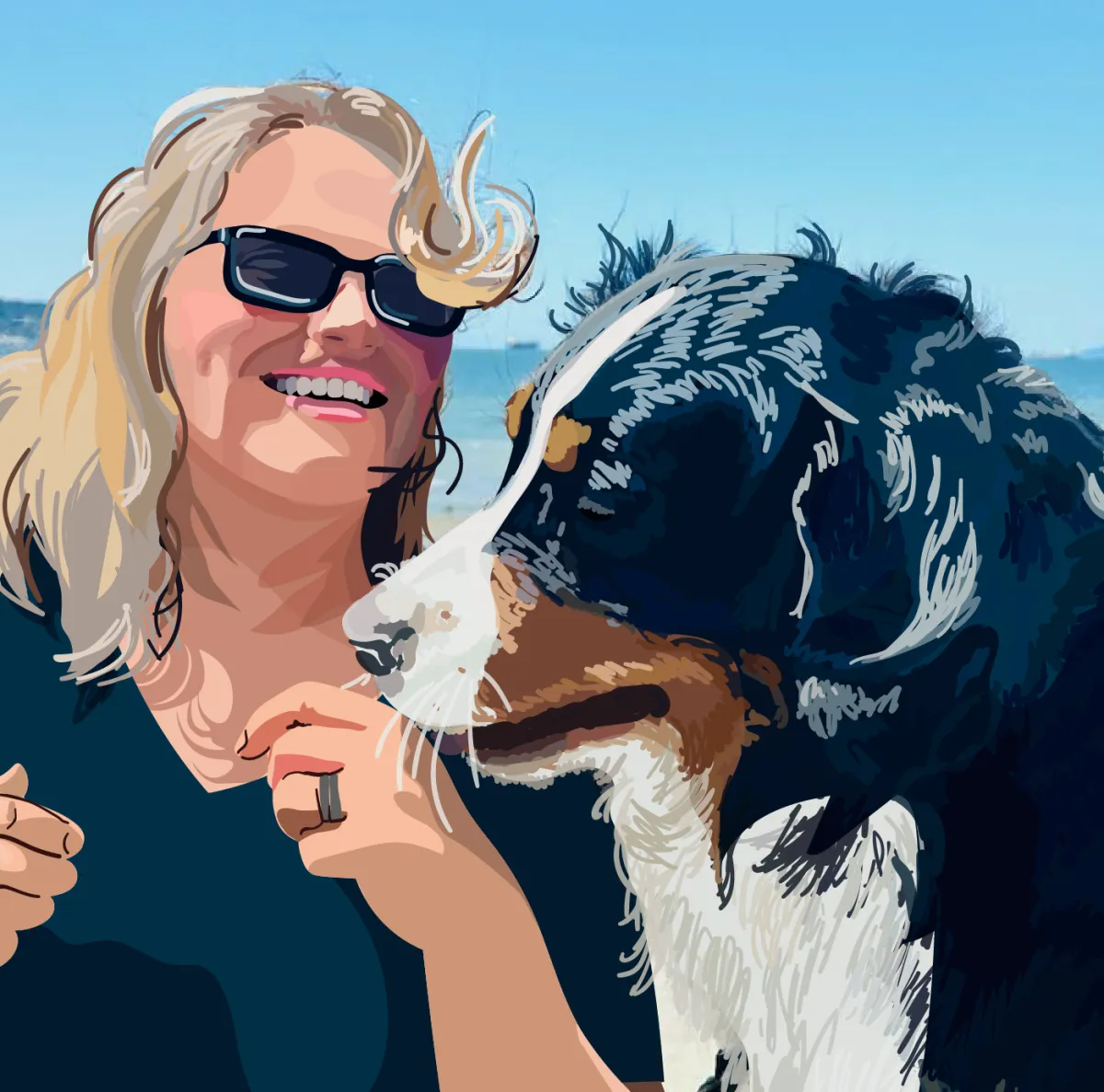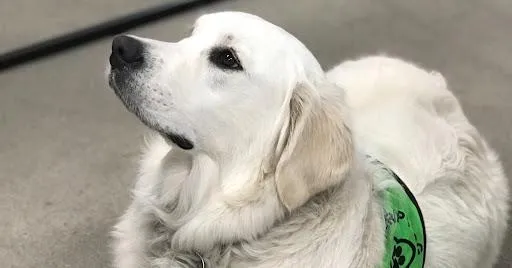

About Us
Since 2011, we’ve combined formal education in psychology, veterinary care, and canine cognition to provide exceptional training.
As an SPCA Accredited AnimalKind organization, we rely on the latest research, while ensuring that our work is rooted in 15,000 years of human-dog connection.
Dogs and humans have evolved together for 20,000 years. They have found food for us, and protected our families and livestock. They have gone to war with us and acted as gentle playmates for our children. They have laid down their lives to save us.
Our lifestyles have changed a lot in the last century, but our need for dogs hasn't. A dog and their owner, when reunited, sync their heart rates within minutes. Just owning a dog decreases heart attack mortality by 30%.
We are designed to live with dogs, but we need to learn how to incorporate them into our chaotic modern lives.
We're here to help your dog become a helpful and contributing member of your modern family.
Forget sit and stay!
At Wag The Dog we can teach dogs to:
Find our phones and keys when we lose them.
Find our children when we lose them!
Put recycling in the blue bin.
Fetch their own leash for walks.
Comfort us when we are sad or stressed.
Close doors and cupboards.
Imitate our actions.
Communicate their needs and thoughts clearly.
Recognize fragile people like children and the elderly and be cautious around them.
Assist us with our disabilities
Accompany us on outings to stores and markets.
Trust us to return home to them when we go out.
Understand simple phrases and two step instructions.

Carol Millman (she/her)
- Lower Mainland
B.Sc, Psychology, Veterinary Technologist, Certified Pet Dog Trainer - Knowledge Assessed (2022), Certified Trick Dog Instructor
Carol lives in Port Coquitlam and works in the Lower Mainland. Her autism gives her a unique perspective which she brings to her work with both dogs and people. Her time working as a veterinary nurse culminated in becoming the Director of Medical Services at a holistic veterinary clinic.
In 2008, Carol was hired as an apprentice Advanced Instructor at Pacific Assistance Dogs Society (PADS). She trained and placed wheelchair assistance dogs, hearing dogs for the Deaf, and facility therapy dogs. She also ran puppy classes and assisted in the daily care of the dogs in training.
PADS still sends people Carol's way when they are looking for private service dog training.

- Currently On Leave -
Amelia Kellum (she/her) - Fraser Valley
B.Sc Canine Studies, Certified Professional Dog Trainer Knowledge/Skills Assessed (2022), Certified Trick Dog Instructor.
Amelia is a certified professional dog trainer with nearly two decades of experience training dogs - including hunting, acting, and assistance dogs such as hearing, therapy, guide, and mobility dogs.
Amelia has learned directly from Bonnie Bergin, pioneer of the disability assistance dog, and is also a graduate of the Ben Kersen and the Wonderdogs professional trainer's program.
She apprenticed at PADS as an instructor and has been training independently since 2010. She now lives in Hope with her family.
What can you achieve
with our help?
Come check out our blog!

Let Certified Dogs Fly: An Open Letter to the Canadian Transportation Agency
Let Certified Dogs Fly: An Open Letter to the Canadian Transportation Agency
Carol Millman B.Sc, CPDT-KA, CTDI
February 28, 2022
To The People At The Canadian Transportation Agency,
Fully certified service dogs are being denied flights in Canada, and it's all your fault.
When you drafted your "Accessible Transportation for Persons with Disabilities Regulations", you used language that has been used to repeatedly discriminate against people with government-verified disabilities.
I hope you're proud of yourselves.
British Columbia, Alberta, and Nova Scotia all have provincial standards in place to assess the quality and necessity of service dogs. Dogs in these provinces are put through in-person assessments to ensure that they are properly trained and do not present a hazard to the public.
In all three provinces with service dog regulatory laws, applicants must provide medical proof that they need the dog, describe what the dog does to assist with their disability, give the name of the training program they went through, and must demonstrate that their dog is gentle, under control, and well trained.
Any government-certified dog should be permitted to fly in Canadian airspace. Don't you agree?
So why are certified dogs being denied by airlines including Air Canada, Westjet, and Lufthansa?
Your guidelines describe a service dog as
"a dog that has been individually trained by an organization or person specializing in service dog training; and performs a task to assist a person with a disability with a need related to their disability."
You make no mention of whether the dog has actually been assessed by a government regulatory body.
You're Supposed To Regulate, Not Discriminate.
We all know that for years, airlines have put up with ill-behaved, untrained dogs in the name of "Emotional Support Animal".
Emotional Support Animals are not service dogs, as I have maintained for a long time.
People have been bitten by supposed "Emotional Support Animals" on more than one occasion.
The airline industry is fed up with these dogs and frankly I can't blame them. When we put a vest on our dogs and request the right to bring them where pet dogs are not permitted, we take on a burden of responsibility to ensure that our dog causes no hardship to the people around us and the businesses accommodating us.
People regularly and routinely violate that trust by putting a vest on their dog who can't even walk in heel position and declaring it a service animal.
And so, the American and Canadian governments have altered their guidelines to make it harder for these "fake" service dogs to get into the cabin of the plane. I approve of this. False service animals, and the tolerance of them, ruins the reputation of service dogs everywhere, and belittles the amount of work and training that goes into them.
Quite frankly, poorly behaved false service animals ruin the reputation of dogs everywhere, because they make people say things like "see, this is why no dogs should be allowed on planes."
If well mannered, well socialized dogs were the norm, we'd be able to bring our pets on flights more easily.
In any case, my point is that since the purpose of these guidelines was to limit the dogs admitted under the auspice of disability, and to ensure that those permitted are properly trained, the regulations as written are not doing the job.
Government Certified? Don't Care. You Can't Board Our Plane Wearing THAT!
"We don't follow PROVINCIAL law. When we fly, we follow FEDERAL regulations," an Air Canada employee told a client of mine loftily. This client, whose dog is fully certified by the government, and who has graduated training with me, was forced to leave her dog with her parents on a flight to William's Lake this summer. A flight within British Columbia, but still not protected by the BC Guide Dog and Service Dog Act.
They didn't care that the dog was certified. They wanted a letter from me, and it turns out I didn't write it well enough.
First, the letter had to reveal my client's disability and specify exactly what the dog does for them. I found that out when Lufthansa refuse to let one of my clients fly unless she fully disclosed exactly which task the dog does for her, so they could assess it and decide if it was REALLY necessary in-flight.
Oh, and even if I reveal the nature of my client's disability and the exact nature of the task, airlines still tend to deny the client unless I specify that I, personally, trained that task.
One of my clients needed me to reword the letter at the 11th hour to change passive voice ( dog has been trained) to active voice (I trained the dog) otherwise Air Canada said they would not allow her fully certified dog to fly.
When my next client to fly chose WestJet, she was assured that my letter ( now featuring active voice) was sufficient, until the weekend before she flew... when she was informed that they require the dog to be wearing a cape with my logo on it.
The client has a very nice cape which is much better than my cookie-cutter client cape. But we had to do a last-minute scramble for a client living nearby who was willing to give up their cape.
These hurdles are completely ridiculous, because not ONE of them prove what that airlines actually want to know - that the dog will behave itself.
In-Person Assessment Is Better Than A Well-Written Letter.
KLM has a good solution which is far better than demanding active voice in letters or creating guidelines on the dress code for dogs on planes.
A client who flew KLM had a very nice experience. They took her certification and her letter politely, but told her there would be an in-person assessment at the airport. No problem. The dog was fully certified and ready to be in public, and the simple obedience test at the airport was easily passed.
All of the other certified dogs who were turned away or nearly turned away over the past few months by various airlines would also have handled a basic obedience test without the slightest difficulty.
When everything is said and done, the purpose of all these regulations is to ensure safe passage for all passengers, and to ensure that the airline staff don't have to keep a rabies pole in the cockpit.
The best way to do this is for an independent judge to ensure that the dog has basic public manners - can hold a stay, walk on a loose leash, and handle greetings with strangers politely. My clients graduate with just this sort of a test - the test is run by the Justice Institute, which has no affiliation with me whatsoever. This means that if they pass, they did so entirely on their own merit.
That card, issued by the government, means far more than a letter from me, attesting to the fact that I have worked with the dog and deemed it worthy. It means more than a cape with my logo on it. It means the dog has been thoroughly tested, that the person's medical need for the dog has been verified by the government, and that it is a service dog.
And if you won't trust Canada's own provincial governments to inspect the dog's veracity properly... then tell the airports to do it themselves so that disabled people can get on the bloody plane with their medical aid.
Sincerely,
An Angry Service Dog Trainer

We work on land which was taken from the nations who had lived here for thousands of years. They are still here and they are still waiting patiently for us to stop being jerks about it.
© 2024 Copyright Wag The Dog Training
All Rights Reserved




